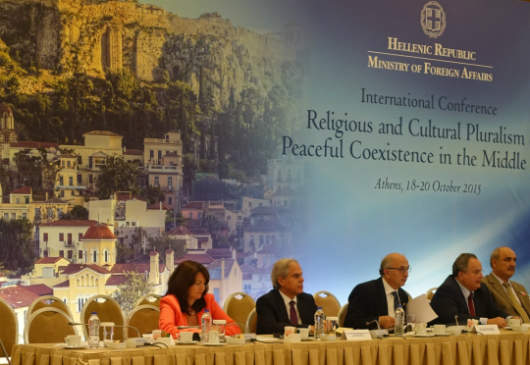 N. KOTZIAS: I thank all of you for coming to Athens so that we could spend these two days together, proving that we can talk, engage in dialogue and exchange views.
N. KOTZIAS: I thank all of you for coming to Athens so that we could spend these two days together, proving that we can talk, engage in dialogue and exchange views.
Yesterday, at the opening of our cultural event with Thanos Mikroutsikos, I stressed that politics, at least as I perceive it, and religion have in common that we are people-centered and that in both politics and religion there needs to be sentiment. There needs to be sentiment that supports love of freedom and combines – as we said in yesterday’s morning session – tolerance and respect.
During our Conference, we heard participants from most of the countries of Europe, the Middle East, as far away as India, and I thank everyone for making the long journey – they came from the U.S., from Canada and from other places. We heard some 70 speakers from 45 organizations and international organizations.
We talked about culture and religion. Culture describes what we are and the unspoken. Religion describes what we are like and how we want to be, and, for that reason, fanatics are found far from religion and culture. And I want to underscore once again: Fanatics are not just those who act in the name of religion, but those who act in the name of opposition to religion.
In the discussion we had over these two days, we set down a number of proposals and legal and institutional issues. I remember the first political speaker and his proposal for protection of monuments from looting. We will put these in order, classify them, and send them to you.
I think we all agree that the disappearance of religious and cultural minorities from the Middle East would mean destruction of tradition, of history, of the cultural and religious pluralism that produced global achievements and influenced the major global religions. And should they be destroyed, it would be a loss for all humankind.
We also agreed on some goals that may sound political, but they are deeply human and concern religion. The need for a political solution to the Syrian conflict, the need to support the Iraqi state and not to hesitate in the fight against terrorism and extremism.
Moreover, we agreed that there is an urgent need for immediate initiatives for supporting religious and cultural minorities, for confronting the refugee crisis, and for protecting the monuments in the region.
I also believe that we all feel deep satisfaction – spiritual and intellectual – at hearing everyone else’s views, which was a great contribution from a humanitarian, academic and political standpoint, while we were able to establish a framework for ongoing dialogue and coexistence of different views, which we want to continue, and which is something that characterized our International Conference.
I would like to refer briefly to three last issues: One is that we are thinking of publishing the minutes of this International Conference in book form. Second, that we adopt the resolution that has been proposed to you as a resolution of the Presidium, so that we do not enter into a discussion of wording, due to the wide range of states and views we had. We have borne in mind all of the observations, it will be issued by the Presidium, and I hope it is useful to everyone.
And last but not least, we will move ahead to the creation of the Observatory. The Observatory will be headed by Professor Sotiris Roussos, who is the most well-known Arab studies expert at the Greek universities, with great contacts and understanding of the problems of the Middle East, together with a staff of young people and high-quality scientists.
And I appeal to all of you. Many of you have already expressed the intention of participating in the formulation of the goals and objectives of this Observatory, of participating in its tasks, or at least supplying it with thoughts and information.
I must say that for me, personally, having initiated this endeavor for the International Conference six months ago – that is, during my previous term – it was moving to have you all here; the presence of many friends, and that I made new friends.
The presence of Church leaders, the presence of all of these people of the Churches; Patriarchs, Rabbis, Muftis, leaders of their religions; people far from the universities and from the political stage and religion, from Pakistan to India.
It was a moving two days, achieved thanks to the work of a group of people from our Ministry, and I want to thank them publicly. There is the head of the task force for the Conference, Ambassador Amiridis, who will be leaving us shortly for Brazil. There is the Foreign Minister’s Secretary General, Dimitris Paraskevopoulos, the team of diplomats from my office, under Ambassador Tasia Athanasiou, with the special contribution of Mrs. Argyro Papoulia, and all of the collaborators, as well as my team of advisors.
I also want to thank the Information and Public Diplomacy Department for the wonderful work they did, as always, and we have Mr. Koutras with us, and Mr. Efthymiou, and all of their team. I want to thank all of the people who ensured the excellent organization and hospitality, which is something natural at a hotel such as this, but, as we all know, something so badly needed by people who are currently less fortunate.
I thank everyone. First of all, I thank all of you and I thank the people of my Ministry. I hope we stay in contact and continue our exchange of ideas.
I wish you pleasant journeys. Think positive thoughts of us, remember that Greece is a crossroads of cultures and religions.
My heartfelt thanks. I bow to you all.
October 20, 2015


